Health Care Ethics - Assignment PDF
VerifiedAdded on 2021/05/31
|8
|2036
|52
AI Summary
Contribute Materials
Your contribution can guide someone’s learning journey. Share your
documents today.
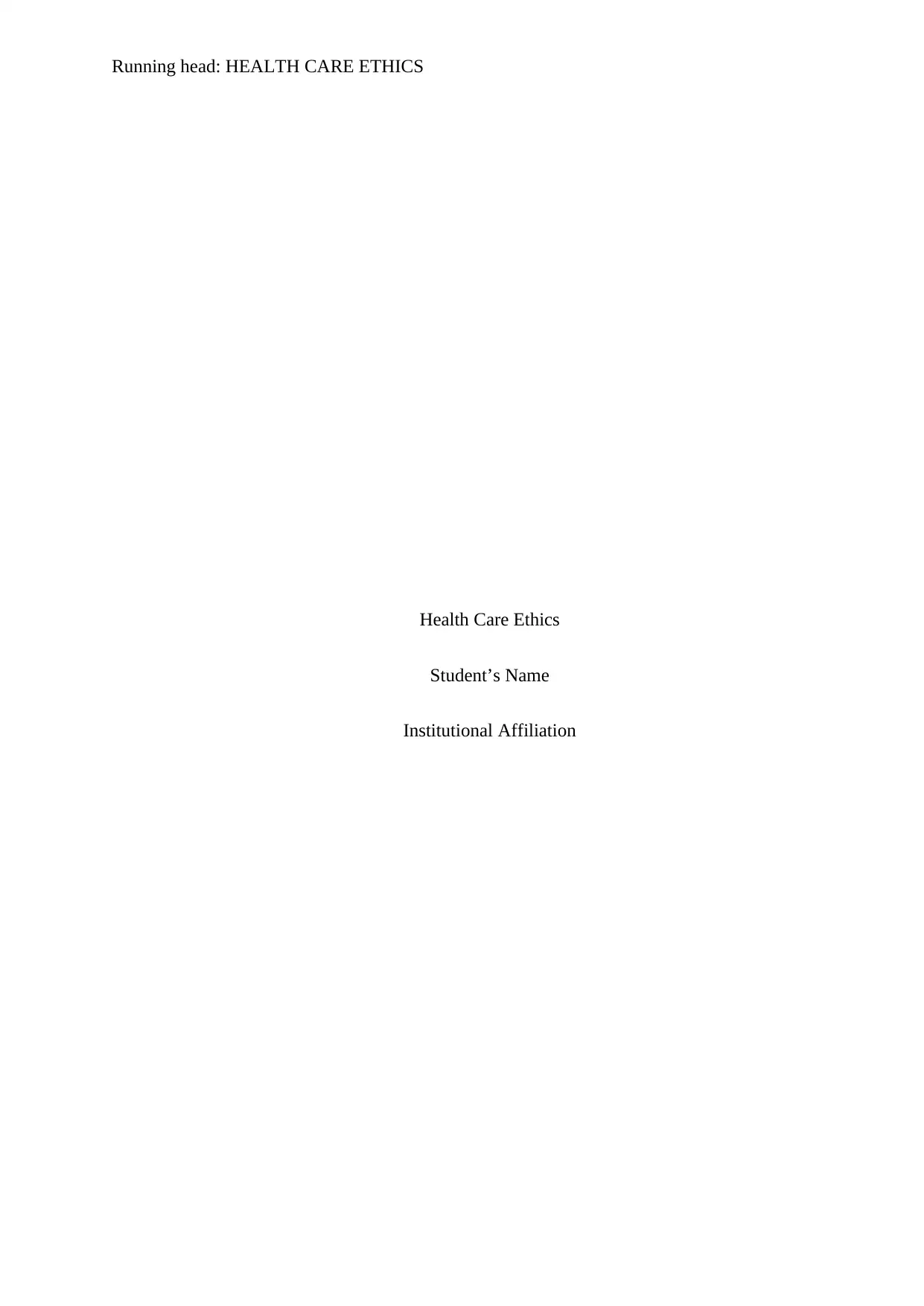
Running head: HEALTH CARE ETHICS
Health Care Ethics
Student’s Name
Institutional Affiliation
Health Care Ethics
Student’s Name
Institutional Affiliation
Secure Best Marks with AI Grader
Need help grading? Try our AI Grader for instant feedback on your assignments.
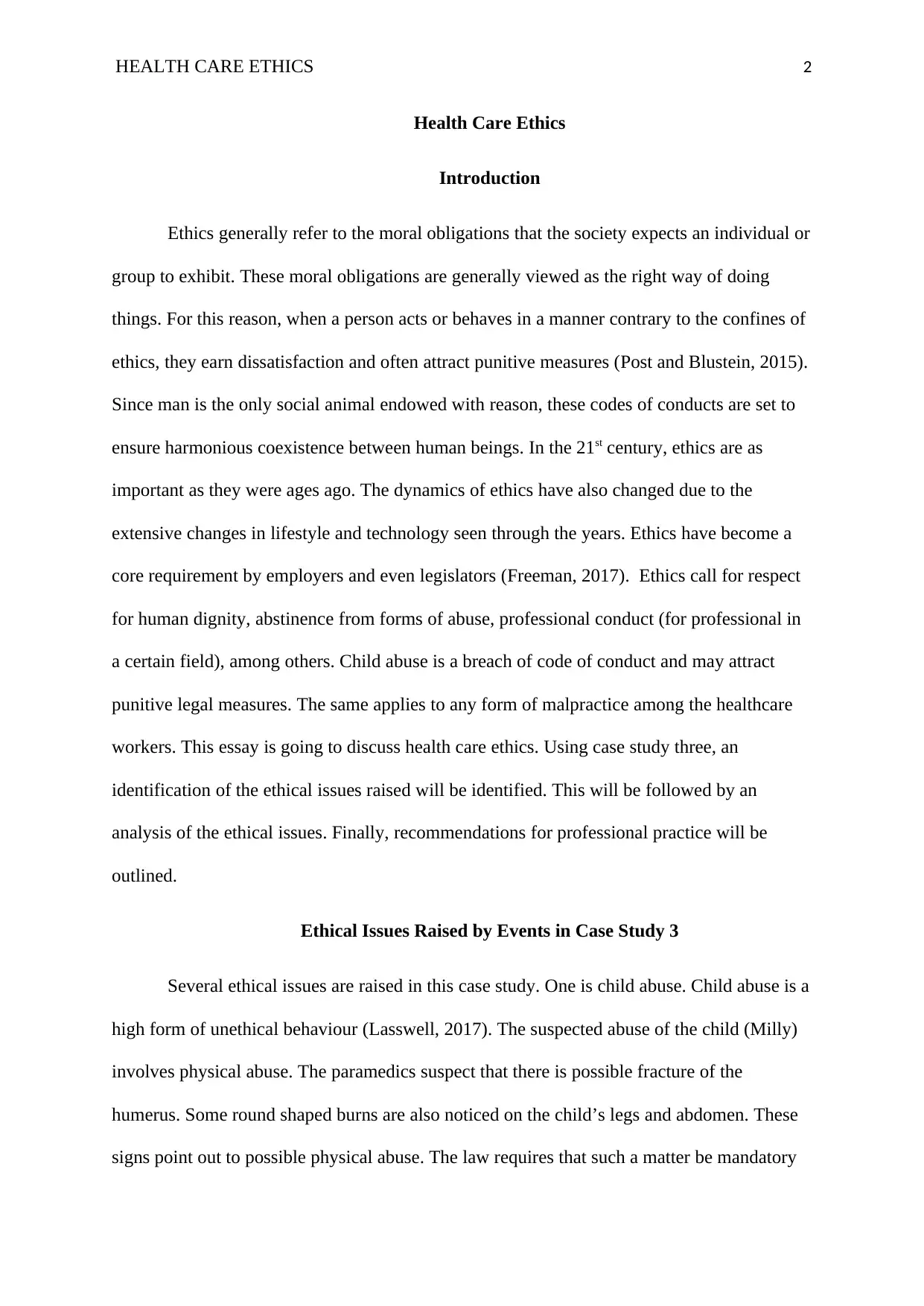
HEALTH CARE ETHICS 2
Health Care Ethics
Introduction
Ethics generally refer to the moral obligations that the society expects an individual or
group to exhibit. These moral obligations are generally viewed as the right way of doing
things. For this reason, when a person acts or behaves in a manner contrary to the confines of
ethics, they earn dissatisfaction and often attract punitive measures (Post and Blustein, 2015).
Since man is the only social animal endowed with reason, these codes of conducts are set to
ensure harmonious coexistence between human beings. In the 21st century, ethics are as
important as they were ages ago. The dynamics of ethics have also changed due to the
extensive changes in lifestyle and technology seen through the years. Ethics have become a
core requirement by employers and even legislators (Freeman, 2017). Ethics call for respect
for human dignity, abstinence from forms of abuse, professional conduct (for professional in
a certain field), among others. Child abuse is a breach of code of conduct and may attract
punitive legal measures. The same applies to any form of malpractice among the healthcare
workers. This essay is going to discuss health care ethics. Using case study three, an
identification of the ethical issues raised will be identified. This will be followed by an
analysis of the ethical issues. Finally, recommendations for professional practice will be
outlined.
Ethical Issues Raised by Events in Case Study 3
Several ethical issues are raised in this case study. One is child abuse. Child abuse is a
high form of unethical behaviour (Lasswell, 2017). The suspected abuse of the child (Milly)
involves physical abuse. The paramedics suspect that there is possible fracture of the
humerus. Some round shaped burns are also noticed on the child’s legs and abdomen. These
signs point out to possible physical abuse. The law requires that such a matter be mandatory
Health Care Ethics
Introduction
Ethics generally refer to the moral obligations that the society expects an individual or
group to exhibit. These moral obligations are generally viewed as the right way of doing
things. For this reason, when a person acts or behaves in a manner contrary to the confines of
ethics, they earn dissatisfaction and often attract punitive measures (Post and Blustein, 2015).
Since man is the only social animal endowed with reason, these codes of conducts are set to
ensure harmonious coexistence between human beings. In the 21st century, ethics are as
important as they were ages ago. The dynamics of ethics have also changed due to the
extensive changes in lifestyle and technology seen through the years. Ethics have become a
core requirement by employers and even legislators (Freeman, 2017). Ethics call for respect
for human dignity, abstinence from forms of abuse, professional conduct (for professional in
a certain field), among others. Child abuse is a breach of code of conduct and may attract
punitive legal measures. The same applies to any form of malpractice among the healthcare
workers. This essay is going to discuss health care ethics. Using case study three, an
identification of the ethical issues raised will be identified. This will be followed by an
analysis of the ethical issues. Finally, recommendations for professional practice will be
outlined.
Ethical Issues Raised by Events in Case Study 3
Several ethical issues are raised in this case study. One is child abuse. Child abuse is a
high form of unethical behaviour (Lasswell, 2017). The suspected abuse of the child (Milly)
involves physical abuse. The paramedics suspect that there is possible fracture of the
humerus. Some round shaped burns are also noticed on the child’s legs and abdomen. These
signs point out to possible physical abuse. The law requires that such a matter be mandatory
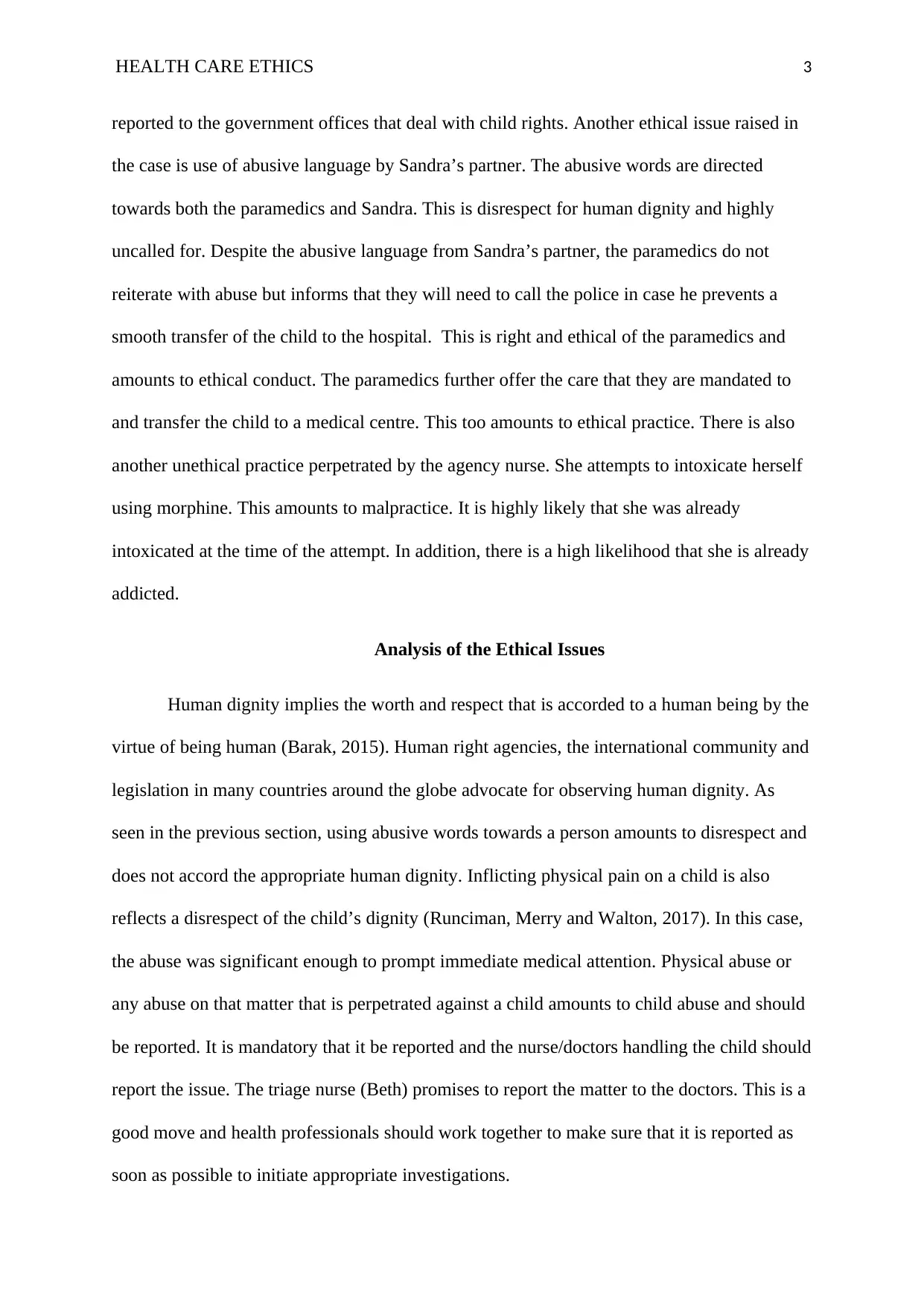
HEALTH CARE ETHICS 3
reported to the government offices that deal with child rights. Another ethical issue raised in
the case is use of abusive language by Sandra’s partner. The abusive words are directed
towards both the paramedics and Sandra. This is disrespect for human dignity and highly
uncalled for. Despite the abusive language from Sandra’s partner, the paramedics do not
reiterate with abuse but informs that they will need to call the police in case he prevents a
smooth transfer of the child to the hospital. This is right and ethical of the paramedics and
amounts to ethical conduct. The paramedics further offer the care that they are mandated to
and transfer the child to a medical centre. This too amounts to ethical practice. There is also
another unethical practice perpetrated by the agency nurse. She attempts to intoxicate herself
using morphine. This amounts to malpractice. It is highly likely that she was already
intoxicated at the time of the attempt. In addition, there is a high likelihood that she is already
addicted.
Analysis of the Ethical Issues
Human dignity implies the worth and respect that is accorded to a human being by the
virtue of being human (Barak, 2015). Human right agencies, the international community and
legislation in many countries around the globe advocate for observing human dignity. As
seen in the previous section, using abusive words towards a person amounts to disrespect and
does not accord the appropriate human dignity. Inflicting physical pain on a child is also
reflects a disrespect of the child’s dignity (Runciman, Merry and Walton, 2017). In this case,
the abuse was significant enough to prompt immediate medical attention. Physical abuse or
any abuse on that matter that is perpetrated against a child amounts to child abuse and should
be reported. It is mandatory that it be reported and the nurse/doctors handling the child should
report the issue. The triage nurse (Beth) promises to report the matter to the doctors. This is a
good move and health professionals should work together to make sure that it is reported as
soon as possible to initiate appropriate investigations.
reported to the government offices that deal with child rights. Another ethical issue raised in
the case is use of abusive language by Sandra’s partner. The abusive words are directed
towards both the paramedics and Sandra. This is disrespect for human dignity and highly
uncalled for. Despite the abusive language from Sandra’s partner, the paramedics do not
reiterate with abuse but informs that they will need to call the police in case he prevents a
smooth transfer of the child to the hospital. This is right and ethical of the paramedics and
amounts to ethical conduct. The paramedics further offer the care that they are mandated to
and transfer the child to a medical centre. This too amounts to ethical practice. There is also
another unethical practice perpetrated by the agency nurse. She attempts to intoxicate herself
using morphine. This amounts to malpractice. It is highly likely that she was already
intoxicated at the time of the attempt. In addition, there is a high likelihood that she is already
addicted.
Analysis of the Ethical Issues
Human dignity implies the worth and respect that is accorded to a human being by the
virtue of being human (Barak, 2015). Human right agencies, the international community and
legislation in many countries around the globe advocate for observing human dignity. As
seen in the previous section, using abusive words towards a person amounts to disrespect and
does not accord the appropriate human dignity. Inflicting physical pain on a child is also
reflects a disrespect of the child’s dignity (Runciman, Merry and Walton, 2017). In this case,
the abuse was significant enough to prompt immediate medical attention. Physical abuse or
any abuse on that matter that is perpetrated against a child amounts to child abuse and should
be reported. It is mandatory that it be reported and the nurse/doctors handling the child should
report the issue. The triage nurse (Beth) promises to report the matter to the doctors. This is a
good move and health professionals should work together to make sure that it is reported as
soon as possible to initiate appropriate investigations.
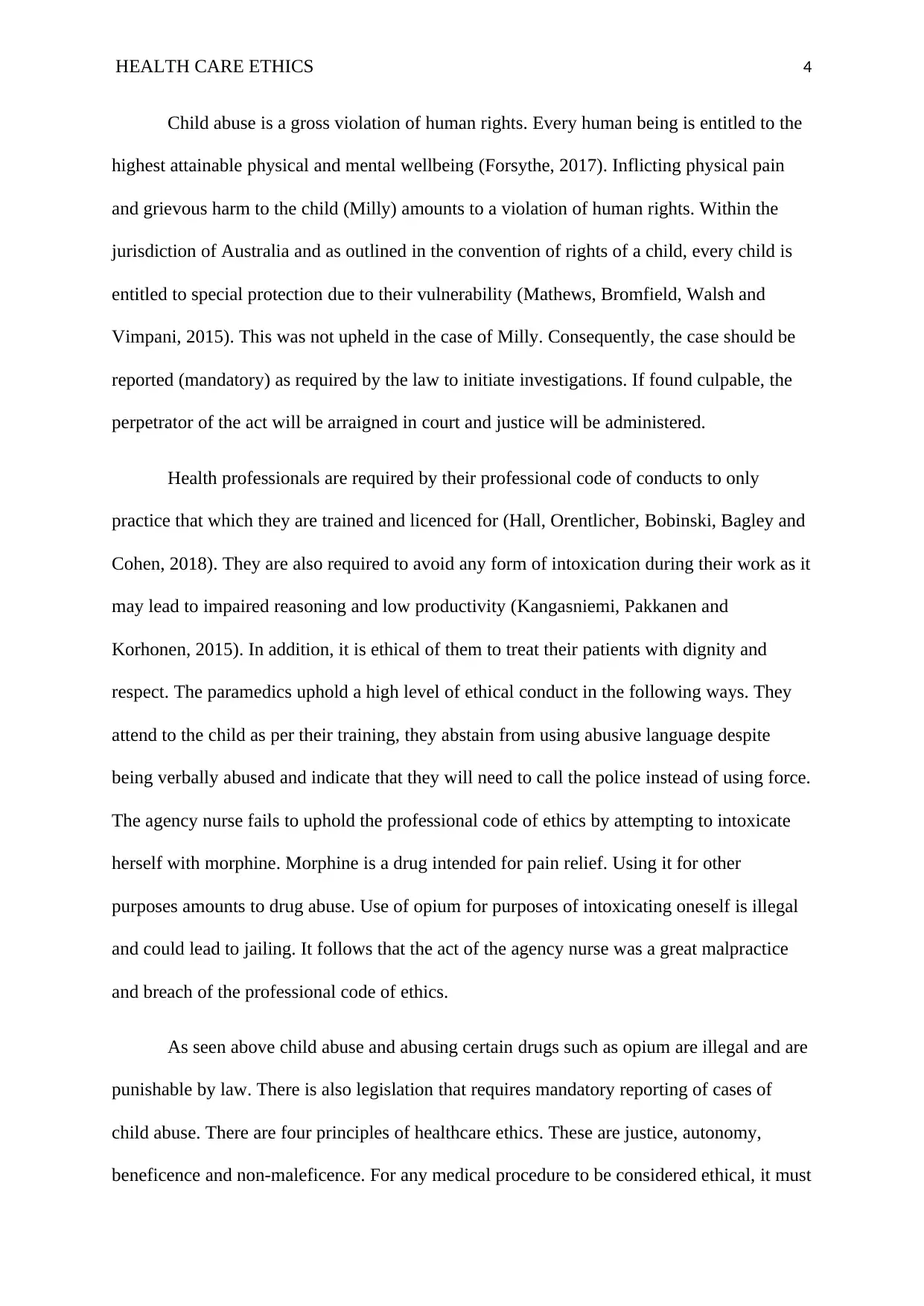
HEALTH CARE ETHICS 4
Child abuse is a gross violation of human rights. Every human being is entitled to the
highest attainable physical and mental wellbeing (Forsythe, 2017). Inflicting physical pain
and grievous harm to the child (Milly) amounts to a violation of human rights. Within the
jurisdiction of Australia and as outlined in the convention of rights of a child, every child is
entitled to special protection due to their vulnerability (Mathews, Bromfield, Walsh and
Vimpani, 2015). This was not upheld in the case of Milly. Consequently, the case should be
reported (mandatory) as required by the law to initiate investigations. If found culpable, the
perpetrator of the act will be arraigned in court and justice will be administered.
Health professionals are required by their professional code of conducts to only
practice that which they are trained and licenced for (Hall, Orentlicher, Bobinski, Bagley and
Cohen, 2018). They are also required to avoid any form of intoxication during their work as it
may lead to impaired reasoning and low productivity (Kangasniemi, Pakkanen and
Korhonen, 2015). In addition, it is ethical of them to treat their patients with dignity and
respect. The paramedics uphold a high level of ethical conduct in the following ways. They
attend to the child as per their training, they abstain from using abusive language despite
being verbally abused and indicate that they will need to call the police instead of using force.
The agency nurse fails to uphold the professional code of ethics by attempting to intoxicate
herself with morphine. Morphine is a drug intended for pain relief. Using it for other
purposes amounts to drug abuse. Use of opium for purposes of intoxicating oneself is illegal
and could lead to jailing. It follows that the act of the agency nurse was a great malpractice
and breach of the professional code of ethics.
As seen above child abuse and abusing certain drugs such as opium are illegal and are
punishable by law. There is also legislation that requires mandatory reporting of cases of
child abuse. There are four principles of healthcare ethics. These are justice, autonomy,
beneficence and non-maleficence. For any medical procedure to be considered ethical, it must
Child abuse is a gross violation of human rights. Every human being is entitled to the
highest attainable physical and mental wellbeing (Forsythe, 2017). Inflicting physical pain
and grievous harm to the child (Milly) amounts to a violation of human rights. Within the
jurisdiction of Australia and as outlined in the convention of rights of a child, every child is
entitled to special protection due to their vulnerability (Mathews, Bromfield, Walsh and
Vimpani, 2015). This was not upheld in the case of Milly. Consequently, the case should be
reported (mandatory) as required by the law to initiate investigations. If found culpable, the
perpetrator of the act will be arraigned in court and justice will be administered.
Health professionals are required by their professional code of conducts to only
practice that which they are trained and licenced for (Hall, Orentlicher, Bobinski, Bagley and
Cohen, 2018). They are also required to avoid any form of intoxication during their work as it
may lead to impaired reasoning and low productivity (Kangasniemi, Pakkanen and
Korhonen, 2015). In addition, it is ethical of them to treat their patients with dignity and
respect. The paramedics uphold a high level of ethical conduct in the following ways. They
attend to the child as per their training, they abstain from using abusive language despite
being verbally abused and indicate that they will need to call the police instead of using force.
The agency nurse fails to uphold the professional code of ethics by attempting to intoxicate
herself with morphine. Morphine is a drug intended for pain relief. Using it for other
purposes amounts to drug abuse. Use of opium for purposes of intoxicating oneself is illegal
and could lead to jailing. It follows that the act of the agency nurse was a great malpractice
and breach of the professional code of ethics.
As seen above child abuse and abusing certain drugs such as opium are illegal and are
punishable by law. There is also legislation that requires mandatory reporting of cases of
child abuse. There are four principles of healthcare ethics. These are justice, autonomy,
beneficence and non-maleficence. For any medical procedure to be considered ethical, it must
Secure Best Marks with AI Grader
Need help grading? Try our AI Grader for instant feedback on your assignments.
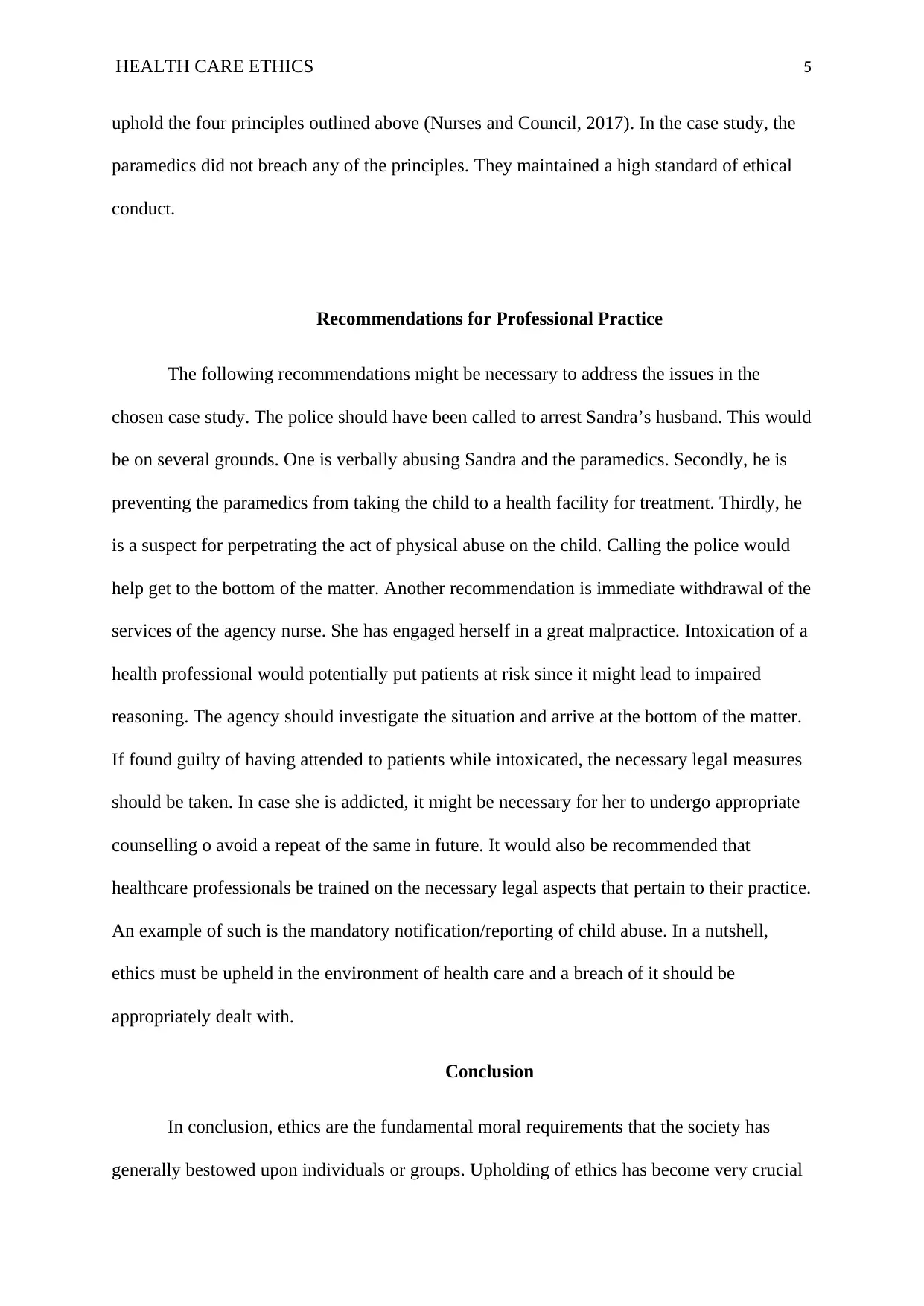
HEALTH CARE ETHICS 5
uphold the four principles outlined above (Nurses and Council, 2017). In the case study, the
paramedics did not breach any of the principles. They maintained a high standard of ethical
conduct.
Recommendations for Professional Practice
The following recommendations might be necessary to address the issues in the
chosen case study. The police should have been called to arrest Sandra’s husband. This would
be on several grounds. One is verbally abusing Sandra and the paramedics. Secondly, he is
preventing the paramedics from taking the child to a health facility for treatment. Thirdly, he
is a suspect for perpetrating the act of physical abuse on the child. Calling the police would
help get to the bottom of the matter. Another recommendation is immediate withdrawal of the
services of the agency nurse. She has engaged herself in a great malpractice. Intoxication of a
health professional would potentially put patients at risk since it might lead to impaired
reasoning. The agency should investigate the situation and arrive at the bottom of the matter.
If found guilty of having attended to patients while intoxicated, the necessary legal measures
should be taken. In case she is addicted, it might be necessary for her to undergo appropriate
counselling o avoid a repeat of the same in future. It would also be recommended that
healthcare professionals be trained on the necessary legal aspects that pertain to their practice.
An example of such is the mandatory notification/reporting of child abuse. In a nutshell,
ethics must be upheld in the environment of health care and a breach of it should be
appropriately dealt with.
Conclusion
In conclusion, ethics are the fundamental moral requirements that the society has
generally bestowed upon individuals or groups. Upholding of ethics has become very crucial
uphold the four principles outlined above (Nurses and Council, 2017). In the case study, the
paramedics did not breach any of the principles. They maintained a high standard of ethical
conduct.
Recommendations for Professional Practice
The following recommendations might be necessary to address the issues in the
chosen case study. The police should have been called to arrest Sandra’s husband. This would
be on several grounds. One is verbally abusing Sandra and the paramedics. Secondly, he is
preventing the paramedics from taking the child to a health facility for treatment. Thirdly, he
is a suspect for perpetrating the act of physical abuse on the child. Calling the police would
help get to the bottom of the matter. Another recommendation is immediate withdrawal of the
services of the agency nurse. She has engaged herself in a great malpractice. Intoxication of a
health professional would potentially put patients at risk since it might lead to impaired
reasoning. The agency should investigate the situation and arrive at the bottom of the matter.
If found guilty of having attended to patients while intoxicated, the necessary legal measures
should be taken. In case she is addicted, it might be necessary for her to undergo appropriate
counselling o avoid a repeat of the same in future. It would also be recommended that
healthcare professionals be trained on the necessary legal aspects that pertain to their practice.
An example of such is the mandatory notification/reporting of child abuse. In a nutshell,
ethics must be upheld in the environment of health care and a breach of it should be
appropriately dealt with.
Conclusion
In conclusion, ethics are the fundamental moral requirements that the society has
generally bestowed upon individuals or groups. Upholding of ethics has become very crucial
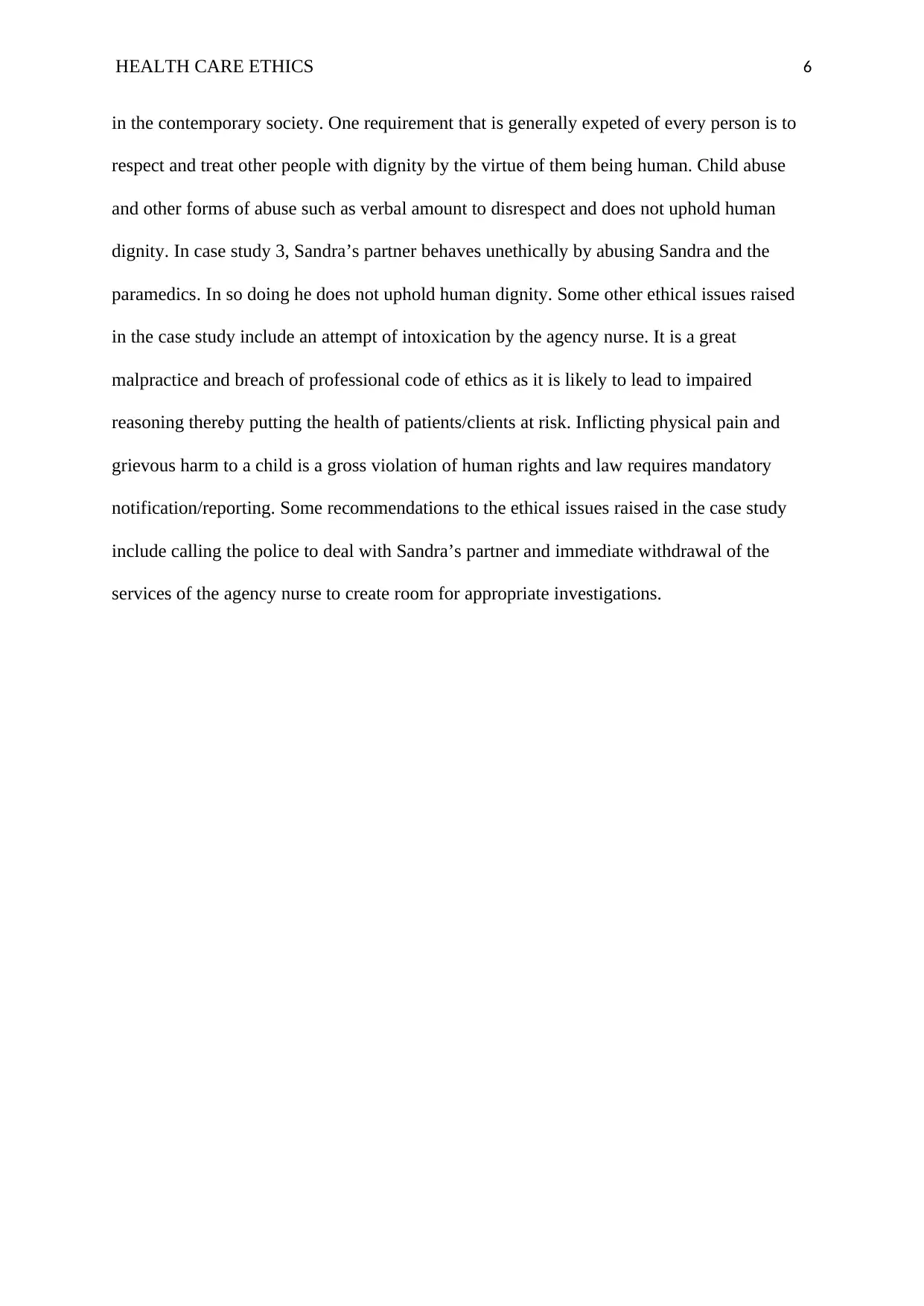
HEALTH CARE ETHICS 6
in the contemporary society. One requirement that is generally expeted of every person is to
respect and treat other people with dignity by the virtue of them being human. Child abuse
and other forms of abuse such as verbal amount to disrespect and does not uphold human
dignity. In case study 3, Sandra’s partner behaves unethically by abusing Sandra and the
paramedics. In so doing he does not uphold human dignity. Some other ethical issues raised
in the case study include an attempt of intoxication by the agency nurse. It is a great
malpractice and breach of professional code of ethics as it is likely to lead to impaired
reasoning thereby putting the health of patients/clients at risk. Inflicting physical pain and
grievous harm to a child is a gross violation of human rights and law requires mandatory
notification/reporting. Some recommendations to the ethical issues raised in the case study
include calling the police to deal with Sandra’s partner and immediate withdrawal of the
services of the agency nurse to create room for appropriate investigations.
in the contemporary society. One requirement that is generally expeted of every person is to
respect and treat other people with dignity by the virtue of them being human. Child abuse
and other forms of abuse such as verbal amount to disrespect and does not uphold human
dignity. In case study 3, Sandra’s partner behaves unethically by abusing Sandra and the
paramedics. In so doing he does not uphold human dignity. Some other ethical issues raised
in the case study include an attempt of intoxication by the agency nurse. It is a great
malpractice and breach of professional code of ethics as it is likely to lead to impaired
reasoning thereby putting the health of patients/clients at risk. Inflicting physical pain and
grievous harm to a child is a gross violation of human rights and law requires mandatory
notification/reporting. Some recommendations to the ethical issues raised in the case study
include calling the police to deal with Sandra’s partner and immediate withdrawal of the
services of the agency nurse to create room for appropriate investigations.
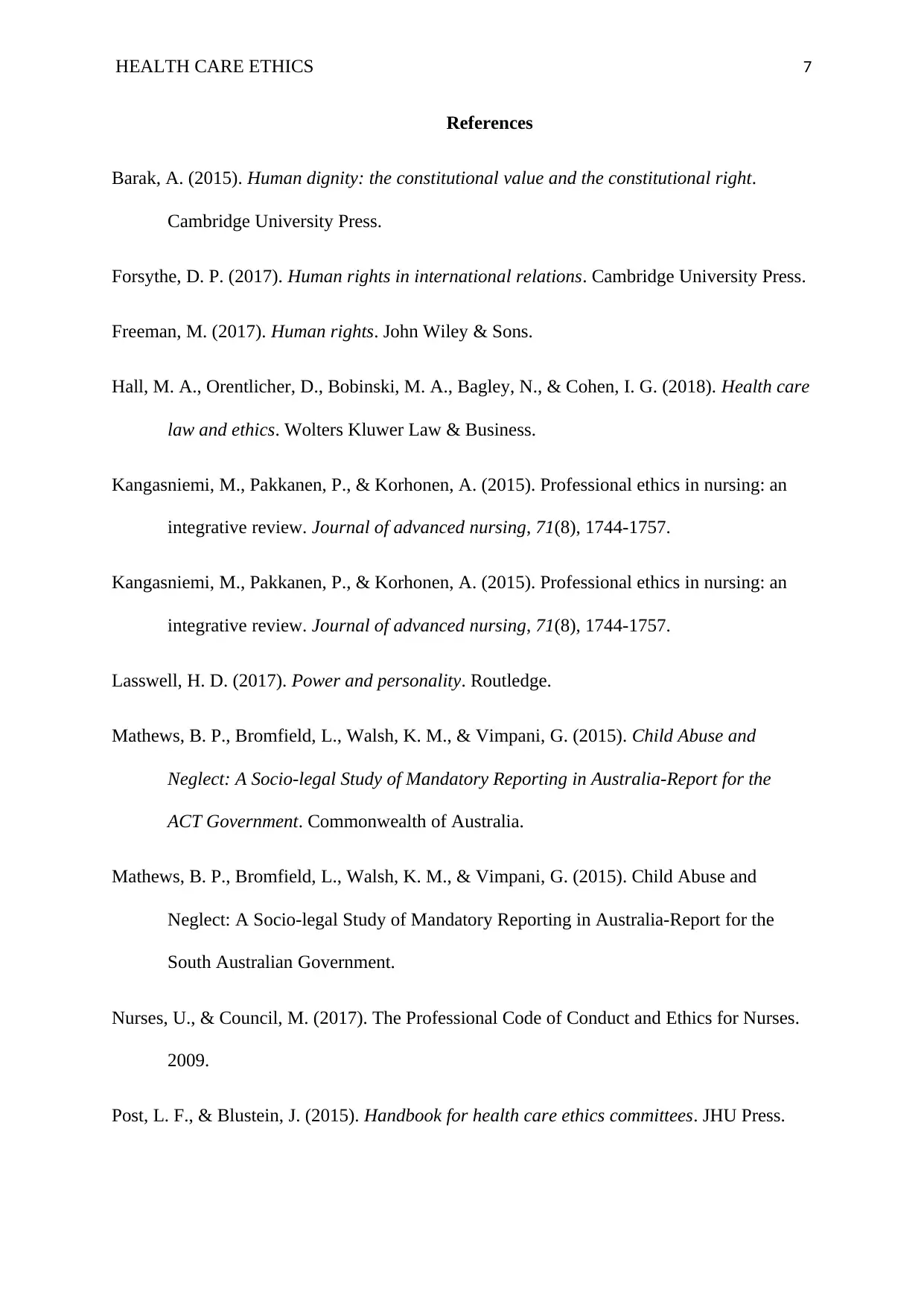
HEALTH CARE ETHICS 7
References
Barak, A. (2015). Human dignity: the constitutional value and the constitutional right.
Cambridge University Press.
Forsythe, D. P. (2017). Human rights in international relations. Cambridge University Press.
Freeman, M. (2017). Human rights. John Wiley & Sons.
Hall, M. A., Orentlicher, D., Bobinski, M. A., Bagley, N., & Cohen, I. G. (2018). Health care
law and ethics. Wolters Kluwer Law & Business.
Kangasniemi, M., Pakkanen, P., & Korhonen, A. (2015). Professional ethics in nursing: an
integrative review. Journal of advanced nursing, 71(8), 1744-1757.
Kangasniemi, M., Pakkanen, P., & Korhonen, A. (2015). Professional ethics in nursing: an
integrative review. Journal of advanced nursing, 71(8), 1744-1757.
Lasswell, H. D. (2017). Power and personality. Routledge.
Mathews, B. P., Bromfield, L., Walsh, K. M., & Vimpani, G. (2015). Child Abuse and
Neglect: A Socio-legal Study of Mandatory Reporting in Australia-Report for the
ACT Government. Commonwealth of Australia.
Mathews, B. P., Bromfield, L., Walsh, K. M., & Vimpani, G. (2015). Child Abuse and
Neglect: A Socio-legal Study of Mandatory Reporting in Australia-Report for the
South Australian Government.
Nurses, U., & Council, M. (2017). The Professional Code of Conduct and Ethics for Nurses.
2009.
Post, L. F., & Blustein, J. (2015). Handbook for health care ethics committees. JHU Press.
References
Barak, A. (2015). Human dignity: the constitutional value and the constitutional right.
Cambridge University Press.
Forsythe, D. P. (2017). Human rights in international relations. Cambridge University Press.
Freeman, M. (2017). Human rights. John Wiley & Sons.
Hall, M. A., Orentlicher, D., Bobinski, M. A., Bagley, N., & Cohen, I. G. (2018). Health care
law and ethics. Wolters Kluwer Law & Business.
Kangasniemi, M., Pakkanen, P., & Korhonen, A. (2015). Professional ethics in nursing: an
integrative review. Journal of advanced nursing, 71(8), 1744-1757.
Kangasniemi, M., Pakkanen, P., & Korhonen, A. (2015). Professional ethics in nursing: an
integrative review. Journal of advanced nursing, 71(8), 1744-1757.
Lasswell, H. D. (2017). Power and personality. Routledge.
Mathews, B. P., Bromfield, L., Walsh, K. M., & Vimpani, G. (2015). Child Abuse and
Neglect: A Socio-legal Study of Mandatory Reporting in Australia-Report for the
ACT Government. Commonwealth of Australia.
Mathews, B. P., Bromfield, L., Walsh, K. M., & Vimpani, G. (2015). Child Abuse and
Neglect: A Socio-legal Study of Mandatory Reporting in Australia-Report for the
South Australian Government.
Nurses, U., & Council, M. (2017). The Professional Code of Conduct and Ethics for Nurses.
2009.
Post, L. F., & Blustein, J. (2015). Handbook for health care ethics committees. JHU Press.
Paraphrase This Document
Need a fresh take? Get an instant paraphrase of this document with our AI Paraphraser
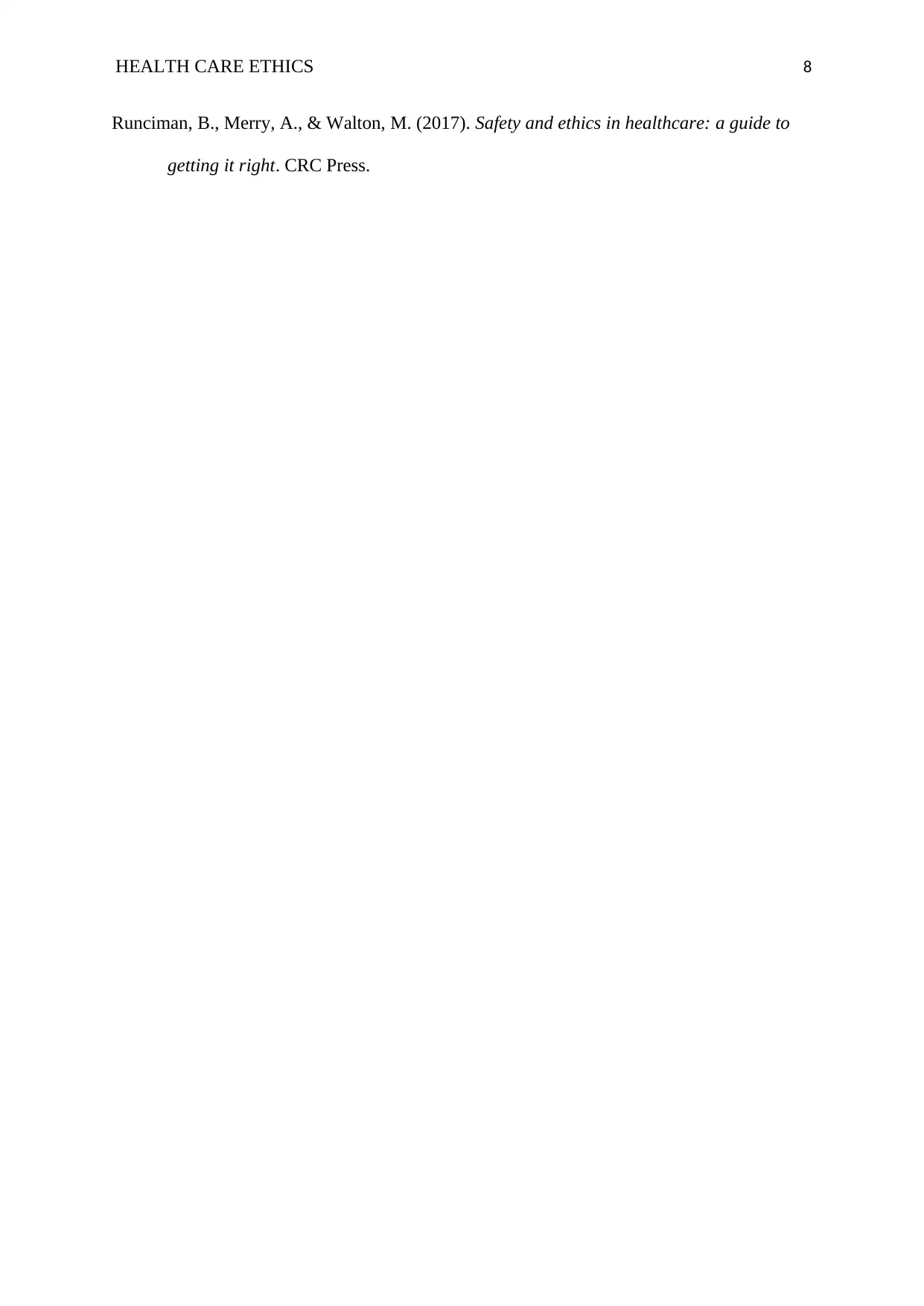
HEALTH CARE ETHICS 8
Runciman, B., Merry, A., & Walton, M. (2017). Safety and ethics in healthcare: a guide to
getting it right. CRC Press.
Runciman, B., Merry, A., & Walton, M. (2017). Safety and ethics in healthcare: a guide to
getting it right. CRC Press.
1 out of 8
Related Documents
Your All-in-One AI-Powered Toolkit for Academic Success.
+13062052269
info@desklib.com
Available 24*7 on WhatsApp / Email
![[object Object]](/_next/static/media/star-bottom.7253800d.svg)
Unlock your academic potential
© 2024 | Zucol Services PVT LTD | All rights reserved.




